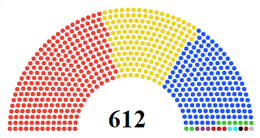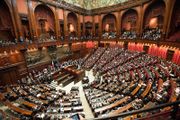Difference between revisions of "National Assembly (Midrasia)"
m |
m |
||
| Line 10: | Line 10: | ||
|leader1=Enzo Décartes | |leader1=Enzo Décartes | ||
|party1=[[Conservateur Partida |Con]] | |party1=[[Conservateur Partida |Con]] | ||
| − | |election1= | + | |election1=9 May 2010 |
|members=612 | |members=612 | ||
|structure1=MDRParliament2012.png | |structure1=MDRParliament2012.png | ||
| Line 24: | Line 24: | ||
{{colorbox|#8C198C}} Independent (1)}} | {{colorbox|#8C198C}} Independent (1)}} | ||
|voting_system1=First-past-the-Post | |voting_system1=First-past-the-Post | ||
| − | |last_election1= | + | |last_election1=5 May 2012 |
|meeting_place=<span style="color:black">Ensemble Nacional<br /> Parliamentary Palace<br /> Thraice<br /> Midrasia</span> | |meeting_place=<span style="color:black">Ensemble Nacional<br /> Parliamentary Palace<br /> Thraice<br /> Midrasia</span> | ||
}} | }} | ||
Revision as of 13:28, 18 April 2015
| National Assembly Ensemble Nacional | |
|---|---|
 | |
| Type | |
| Type | Lower house of the Midrasian Parliament |
| Leadership | |
| Leader of the National Assembly |
Enzo Décartes, Con Since 9 May 2010 |
| Structure | |
| Seats | 612 |
 | |
| Political groups |
7 Groups
|
| Elections | |
| Voting system | First-past-the-Post |
| Last election | 5 May 2012 |
| Meeting place | |
 | |
|
Ensemble Nacional Parliamentary Palace Thraice Midrasia | |
The National Assembly (Midrasian: Ensemble Nacional) is the lower house of the bicameral parliament of Midrasia, which meets in the Parliamentary Palace of Thraice.
The House is an elected body consisting of 612 members known as envoys (Midrasian: envoyiar). Members are elected to represent constituencies by first-past-the-post and hold their seats until Parliament is dissolved.
The National Assmebly evolved at some point in Midrasia during the 18th century, overshadowing the senate as the primary chamber of the Midrasian Parliament.
Under the Parliament Act 1894, the Senate's power to reject legislation was reduced to a delaying power. The Government is primarily responsible to the National Assembly and the prime minister stays in office only as long as he or she retains the support of a majority of its members.
